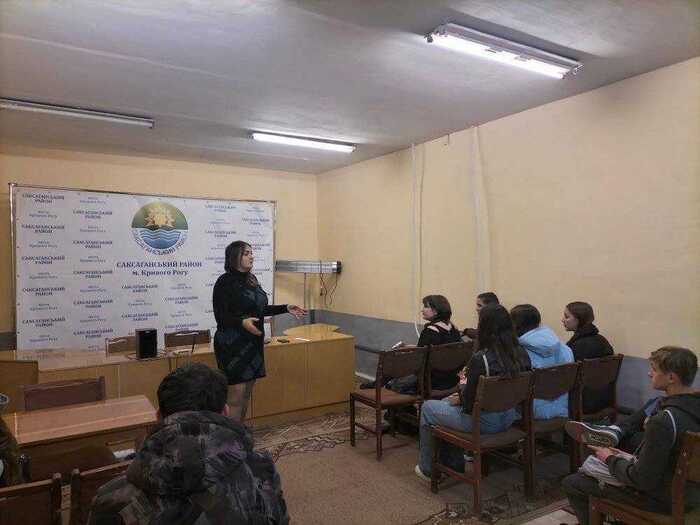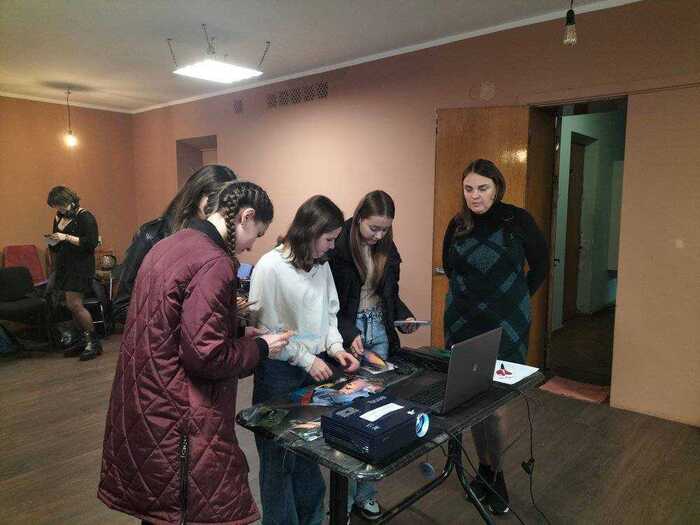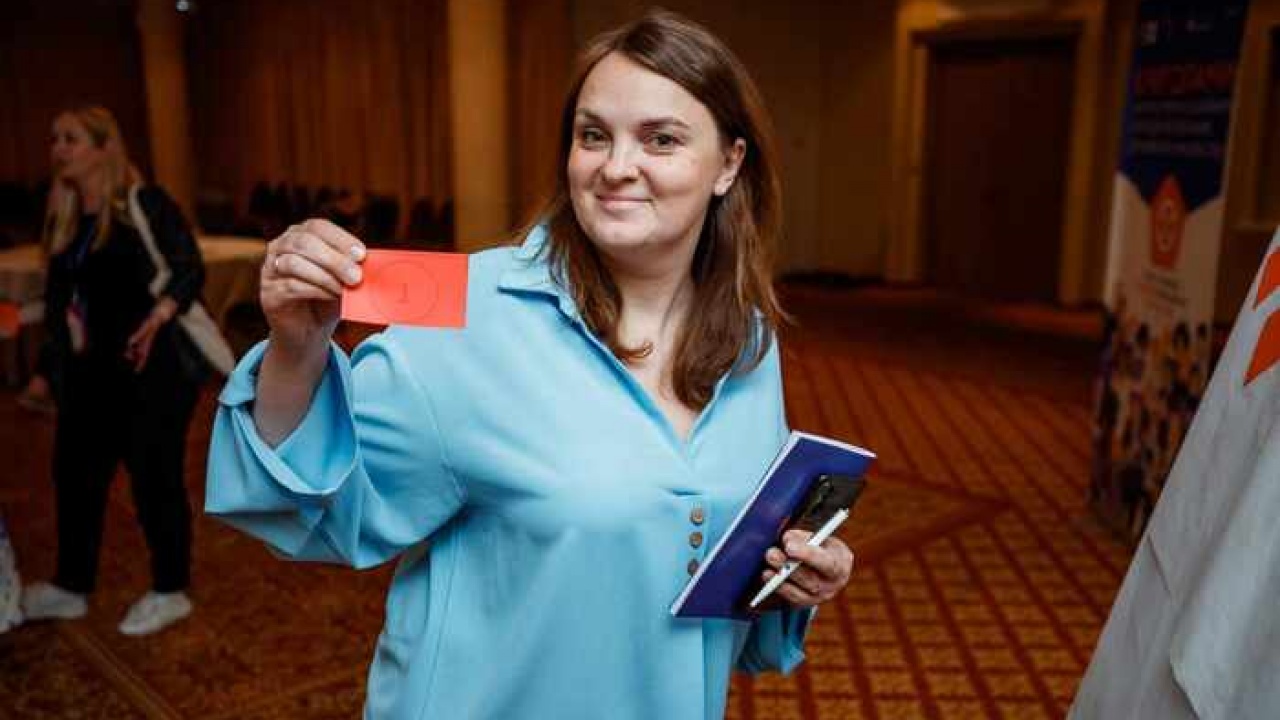Nataliya Kozhemyaka has long worked as a communications manager at the Kryvyi Rih Local Center for Free Legal Aid (FLA). 8 years ago, she joined the DOCU/CLUB Network and opened a Docudays UA human rights documentary film club. Countering bullying and domestic violence became the focus of its work. The film club moderator attended most of the educational institutions in the Kryvyi Rih area with documentary screenings and discussions about bullying and domestic violence. With the support of the DOCU/CLUB Network, Nataliya Kozhemyaka conducted a successful advocacy campaign in her city called “Stop the Violence,” following which, the representatives of the FLA Center joined the city's coordination council for combating violence. Nataliya Kozhemyaka, mediator and moderator of the Docudays UA film club “Pravoznai” at the Professional Development Foundation, tells about her experience and results of legal awareness work in the educational environment.
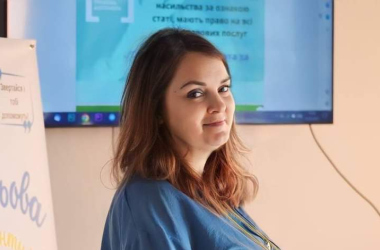
Nataliya Kozhemyaka
“While working in the free legal aid system, I conducted a legal awareness campaign against bullying and domestic violence, targeting schoolchildren, students, and teachers. Documentaries from the DOCU/CLUB network collection helped draw attention to these problems. I organized screenings and discussions of the documentaries ‘Lisa, Go Home!’ by Lithuanian filmmaker Oksana Buraja and ‘Bully’ by American filmmaker Lee Hirsch. The film ‘Lisa, Go Home!’ tells the story of a girl who finds a way to escape the endless alcohol abuse by her mother and her guests. The film makes adults reflect on the experiences and fate of a child. When I show this film to teachers and social workers, on whom the fate of children may depend, it usually results in powerful discussions. People express their pain: which social services work successfully, where they fail, what situations occur, what parents are to blame for, and what changes should be made. It is important for me to turn these discussions into a conversation about what we can do here and now. For example, how to identify manifestations of violence against children in the context of remote education. A teacher may say, ‘I don't see the children, I don't know what's happening to them.’ But if he or she cares, then he or she will call at least one child once a week and ask about his or her life. Even during online meetings with children, the teacher can still find out how they feel. During such meetings, teachers share their experiences, tell their stories, and thus influence each other through the screening of the film and discussion. I always prepare an informational component for discussions at the film club. Viewers should know where to go when they witness domestic violence and how government agencies should respond to such cases. We might think that everyone already knows all this, but this is not the case. Legislation on preventing and combating domestic violence changed in 2018. The Law "On Preventing and Combating Domestic Violence" is an all-encompassing document. It is good if the officials whose duties are spelled out in this law know their part of the responsibility. But what does the next article say? What should another government agency do? After all, the response does not always depend on one institution.
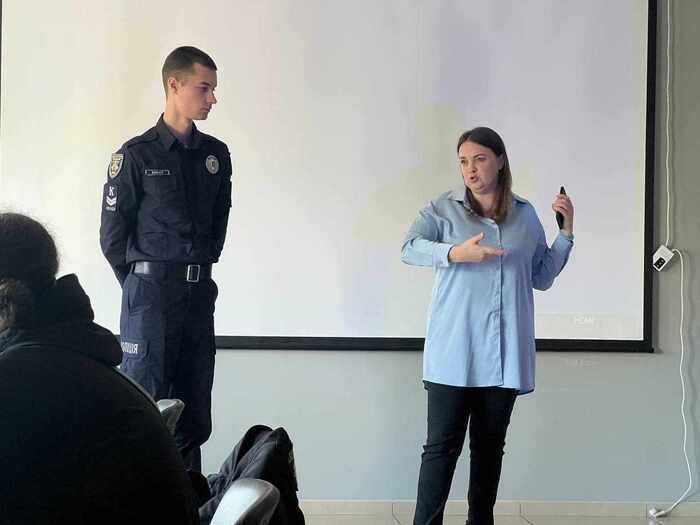
Nataliya Kozhemyaka
For us to achieve results, different services must cooperate, interact effectively, and communicate with each other. It is often the case in our country that everyone locks inside their own little hut. On paper, everything seems to be fine, everything is great: in the reports, there are usually no cases of violence. Where does one get information about such cases, then? Mostly, these are reflected in the police reports, to which people turn in critical moments, in moments of despair. Apparently, many people turn to the police, and then they “disappear” somewhere. One seldom goes to court or social services, just because the interaction between different institutions is not properly established. I have organized film screenings where representatives of different organizations and services came together at the community level and discussed their troubles. The children's service complains that the school is not doing enough work. The school says that it is overworked, and so on. In fact, there should be a coordinator, an authorized person in charge of all this. This is provided for by law, but it still doesn't work well in practice. We are only at the beginning of this journey and the introduction of a new culture means not only prevention and zero tolerance for violence that we are developing in the younger generation, but also changes in the way authorities work and formation of a culture of engagement into this topic. These are major social transformations, and they cannot happen overnight. But our little contributions make a difference. We draw attention, discuss, and educate. I can say that I have shown these films in all the communities of the Kryvyi Rih district. During the teacher training courses at the Dnipro Academy of Continuing Education, we even conduct two-day training: on one day, we show the film ‘Bully’ and talk about safe educational space, and on the second day, we watch ‘Lisa, Go Home!’ and discuss ways to counteract and prevent domestic violence. My teachers and I immerse ourselves deeply into these topics. We give the participants a powerful block of information and send them additional materials with presentations and useful links. I want to believe that this will have an effect - maybe not tomorrow, but the day after tomorrow. My advocacy campaign ‘Stop the Violence’ was organized with the support of the DOCU/CLUB Network in 2020. On the one hand, it had a legal education goal, and on the other hand, its task was to get a representative of the free legal aid system involved in the coordinating council for preventing and combating domestic violence. The problem with Kryvyi Rih is that our city has 7 districts and, accordingly, 7 such councils. But we got the result - specialists were included into 6 of the councils in some communities of Kryvyi Rih district! Once, I participated in a coordination council and met a woman who turned to the police and complained about her husband. The latter wanted to retaliate. I supported her, she received legal aid, fully defended herself in a legal way, and brought her abuser to justice. It would seem that helping a specific person who has suffered from domestic violence was not the goal of the advocacy campaign. But thanks to this cooperation, we got closer to the target audience and were able to improve our work. The Kryvyi Rih district also learned about this case, because I showed the films to all employees of all the educational institutions there. It's quite fruitful - the work is developing and people are happy to join the events. They realize that we are working together side by side. At that time, my colleagues, psychologist Marianna Tropina and lawyers Nataliya Radionova and Tamara Bugayets, also joined my advocacy campaign. We invited police representatives to meetings and tried to find like-minded people from different structures. It is impossible to organize a large-scale campaign on your own. However, as soon as you start doing something useful, other people join you. We had another project for teachers, in which the ‘Echo’ playback theater joined us. The actresses reveal this topic through their emotions, thus supplementing our team. After this project ended, another organization got in touch with us and offered to work together. We are no longer looking for partners - they just come to us. The audience is expanding in different ways. During the blackouts, we planned an event for educators from all over the region and started looking for a place without power outages. I went to the local “point of invincibility,” held an event with educators there, and all the people who were at the “point of invincibility” at the time were also able to join us. DOCUMENTARY FILMS HELP BUILD ZERO TOLERANCE FOR VIOLENCE The advantage of the film club is that, during the discussions of films, people build new bridges, new understandings, new realizations. It's more than the usual lecture format. Watching a film adds an emotional component, never leaving the audience indifferent. When they see the story of Liza on the screen, they remember cases of real children in even more horrible situations. We raise important issues and try to come up with some solutions as a result of discussions. Sometimes it happens that we have a discussion, and then people get in touch with us regarding this topic because they need an explanation or additional information. After the ‘Stop the Violence’ advocacy campaign, my colleagues and I implemented the ‘Zero Tolerance for Violence’ project with the support of the United Nations Population Fund. We have changed the vantage point a bit, conducting trainings for trainers and using film screenings. As a result of these trainings, the participants held 150 events with the target audience without any administrative coercion from us. This is impressively systematic work, because our city is very large, and it would be impossible to cover it in one event. So we found a different solution: we invite at least one responsible person from each district, give this person all the necessary materials, and he or she works from there. Of course, I can't track the effectiveness everywhere, but I hope that we are able to unite more and more people around the topic of combating bullying and domestic violence. I tried to show the film ‘Bully’ to schoolchildren as much as possible. We had an interesting format of work. During the lockdown, we planned a series of anti-bullying awareness raising events together with the police. We held three events over three days, one for teachers and one for children. Coincidentally, it was at this time that schools came out of lockdown. Teachers gathered their schoolchildren and showed the films in the assembly halls, so in three days we reached out to more than 1,600 children with screenings and discussions. It was very nice when children expressed their attitude during the discussion. The film evokes deep emotions in children, sometimes they even cry. We talk to them about the fact that everyone deserves to be happy. There is a phrase in the film: ‘If you have lived a day without doing harm to anyone, it is already good.’ Children are not very willing to open up in front of teachers. During one screening, I gathered children of internally displaced persons and civil society activists, and I heard so many stories! So many cases, so many complaints about teachers and the situation in schools! All the screenings are different. Sometimes it is difficult to reach the audience, and sometimes the discussions are very heated. At times, it seems to me that students are generally overwhelmed by the topic of bullying, which is being discussed a lot in schools. But I would like psychologists and teachers in schools to give more than just theoretical information about bullying. At least, I don't limit myself with theory. Every time, I try to raise the topic of bullying from a human rights perspective. I even have a presentation titled ‘The conversation is not about bullying,’ because I primarily discuss human rights. When we realize our right to dignity, respect, and safety, we can move on to the ways to protect ourselves. These are the tools of protection that I make sure to voice. I tell children what the responsibility for bullying is now. We talk about the fact that children can be appointed a lawyer at the expense of the state to protect their rights. Such conversations gradually add to the understanding that children attend an educational institution to learn and develop, not to harm each other. They begin to realize that everyone has the right to safety and respect, and no one has the right to violate it. And responsibility for violating the rights of another person must be inevitable.” The development of the DOCU/CLUB Network is funded by the United States Agency for International Development (USAID), the Embassy of Sweden in Ukraine, the National Endowment for Democracy (NED) and Fondation de France. The opinions, conclusions, or recommendations are those of the authors and compilers of this publication and do not necessarily reflect the views of the governments or charitable organizations of these countries. The authors and compilers are solely responsible for the content of this publication.
IT IS IMPOSSIBLE TO ORGANIZE A LARGE-SCALE CAMPAIGN ON YOUR OWN
